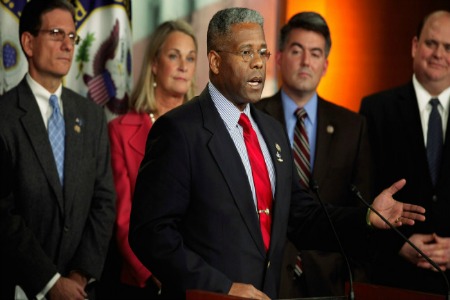
Rumors of the demise of the Tea Party have been greatly exaggerated.
The victory of Mitt Romney in the GOP primaries over more conservative opponents, the resounding reelection of President Obama and defeat of Tea Party favorites like Florida’s Allen West suggested that the movement was much weaker than when it rose to power in 2010.
But the fiscal cliff debated has illustrated the enduring influence of the Tea Party and more broadly, the power of very conservative members of the Republican Party. It’s generally assumed in Washington that both President Obama, House Speaker John Boehner and Senate Republican Leader Mitch McConnell could easily reach a deal to resolve the fiscal cliff if just the three of them were negotiating.
Instead, Boehner in particular must constantly worry about appeasing the political right. Many of the 241 Republicans in House are very worried if they vote for a tax increase, or essentially any bill President Obama also supports, they will face a primary challenge from a more conservative candidate and potentially lose. Most House districts have been drawn so that they are either heavily-Democratic or heavily-Republican, so the easiest way for a Republican to remain in office is to placate conservatives at all times, as there is little chance in many of these districts for a Democrat to win. (Here’s the New York Times’ Nate Silver explaining that of the 435 House districts, about 125 are overwhelming conservative, while 117 heavily favor Democrats.)
This dynamic was illustrated very clearly when Boehner begged and pleaded with Republicans last week, but could not persuade them to back a tax increase on family income over $1 million, far about the $250,000 threshold President Obama is pushing for.
Obama does not face such political pressures from his base. He is pushing for a broader deficit reduction deal that could increase the age that people are eligible for Medicare from 65 to 67 and gradually reduce Social Security benefits. Liberal Democrats are unhappy about both of those ideas as well as Obama’s decision to accept the withdrawal of Susan Rice as a candidate for Secretary of State amid harsh criticism of her from John McCain and other Republicans.
But Democrats in Congress don’t have to worry about primary challenges like Republicans do, as the party’s base is unlikely to punish members for backing something that the Democratic president does.
Republicans in Congress don’t feel such confidence about supporting a policy just because their leaders do. And they shouldn’t. The last three years have seen Republican lawmakers in the House and Senate cast as too moderate and lose primaries because they supported bills like the 2008 Wall Street bailout that party leaders also voted for. Boehner can’t guarantee his members won’t face primary challenges from the right, so there is little surprise they won’t follow his lead.
And the influence of conservatives and the Tea Party will endure beyond the fiscal cliff. Most Republican strategists believe the GOP needs to move to the political left on some issues, particularly immigration and gay rights. They argue the overall Republican brand is very unpopular with minority and young voters in particular, and that makes it extremely hard to win presidential elections.
But individual House Republicans are more concerned about their own reelection than the party’s prospects in 2016. So if Obama pushes for a bill that makes it easier for undocumented workers to become citizens, House Republicans will face a similar quandary to what they are dealing with on the fiscal cliff. Backing the bill would prevent the overall Republican Party from being cast as obstructionist. But for individual members, such a vote would put them in danger of facing a primary challenge from a conservative Republican who casts such legislation as “amnesty.”
https://thegrio.com/2012/12/28/fiscal-cliff-debate-shows-enduring-power-of-tea-party/











